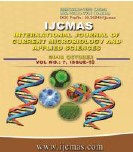


 National Academy of Agricultural Sciences (NAAS)
National Academy of Agricultural Sciences (NAAS)

|
PRINT ISSN : 2319-7692
Online ISSN : 2319-7706 Issues : 12 per year Publisher : Excellent Publishers Email : editorijcmas@gmail.com / submit@ijcmas.com Editor-in-chief: Dr.M.Prakash Index Copernicus ICV 2018: 95.39 NAAS RATING 2020: 5.38 |
1Department of Horticulture (Vegetable and Floriculture)
2Department of Soil Science and Agricultural Chemistry, Bihar Agricultural University, Bhagalpur, Bihar – 813 210, India
A field experiment was carried out at Vegetable Research Farm, Department of Horticulture (Vegetable and Floriculture), Bihar Agricultural University, Sabour during Kharif season of 2017 to study the integrated effect of bio-inoculants, organic and chemical fertilizers on growth, yield and economics of okra. The sixteen integrated treatments consisting chemical, organic and biofertilizers were arranged in a randomized block design replicated thrice. Results revealed that the application of 75 % RDN through chemical fertilizer + 25 % N through vermicompost + Azotobacter @ 20 g kg-1 of seed+ PSB @ 20 g kg-1 of seed (T14) influenced most of the characteristics significantly and recorded the highest values of plant height, number of branches per plant, fruit length, average fruit weight, number of fruits per plant, yield per hectare and B: C ratio (1.62) except number of nodes to first flower appearance, days taken to 50 % flowering and days to first picking, which were the minimum under same treatment (T14). The quality parameters viz. the ascorbic acid, TSS and crude protein content in fruit were also highest in T14 treatment. Thus it can be inferred that 25% of RDN can only be substituted through Vermicompost along with the use of biofertilizers (Azotobacter + PSB)
 |
 |
 |
 |
 |